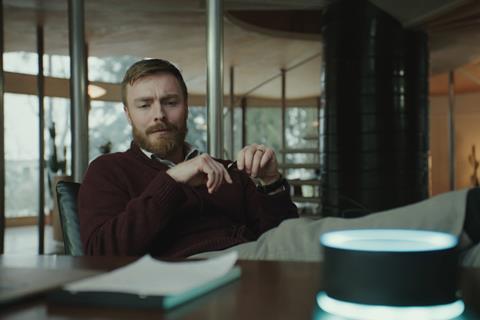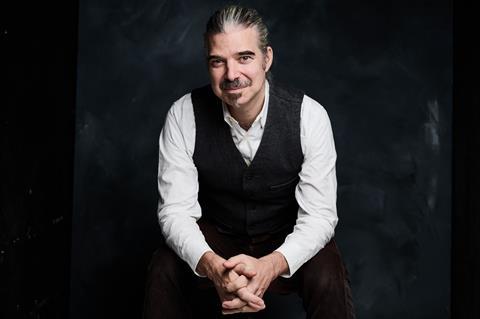
Artificial intelligence (AI) is a hot topic for the film industry, but still something of a taboo. Last year’s US actors and writers strikes were partly sparked by concerns that AI threatened the industry. While many filmmakers are wary about experimenting with the technology, others are actively exploring its creative possibilities and implications.
Among them is Swiss filmmaker Peter Luisi, who is in post-production on his feature The Last Screenwriter, which was written entirely by ChatGPT. While several shorts written by AI have been made, Luisi claims The Last Screenwriter is the first known feature-length script generated by the technology to be filmed.
A co-writer of Switzerland’s 2007 Oscar entry Vitus, Luisi has directed, written and produced eight features and his most recent, comedy Bon Schuur Ticino (2023), is Switzerland’s highest-grossing local title since 2015’s Heidi.
The box-office performance of Bon Schuur Ticino meant Luisi received $745,000 of automatic funding for his next project from two success-based Swiss funds: the Federal Office of Culture’s BAK Succès Cinema and the canton of Zurich’s Succès Zurich. He invested the money in The Last Screenwriter, bolstering its budget to $850,000 with in-kind funding.
The Last Screenwriter began life as an experiment. Wondering if ChatGPT could replace a screenwriter, Luisi gave the generative AI programme a single prompt: “Write a plot to a film where a screenwriter realises he is less good than AI.”
Within seconds, ChatGPT delivered a brief plot. Luisi then asked for characters, based on the plot the AI programme had given him. When they were delivered, he asked for a step-by-step outline for a feature using these AI-derived characters and storyline. Finally, he asked for a script deriving from the plot, characters and outline. The resulting script, says Luisi, is “scarily good — everyone is astonished at how good it is”.
The film centres on Jack, a celebrated screenwriter, who finds his world shaken when he encounters a cutting-edge AI scriptwriting system. Initially sceptical, he soon realises the AI not only matches his skills, but even surpasses him in empathy and understanding of human emotions.
Apart from cutting some scenes and trimming repetitive dialogue, Luisi says he hardly interfered with the script, only doing what any director or film editor would do on a traditional project in collaboration with a screenwriter and in post. “I didn’t create anything… I was just an assistant to what ChatGPT suggested,” he says. ChatGPT received the screenwriting credit for the film.
Experimental storytelling

Luisi shot the 76-minute feature in January with a cast of professional UK actors (“ChatGPT is much better in English than German”). The script is the only element created with AI — everyone else involved in the film is professional and was paid accordingly. The point of the exercise, he explains, was, “Can we take a script written by AI and then make the best movie possible?”
Luisi stresses the experimental nature of the film. His goal is to show what is possible with AI and to contribute to the industry discussion about the potential impact of the technology on filmmaking.
Nobody will profit from The Last Screenwriter, which Luisi hopes will be invited to premiere at a summer festival, before being offered for free online. He also plans to publish all documentation around the film’s creation, including the prompts he gave ChatGPT and the script he received back, on a dedicated website (www.lastscreenwriter.com).
Luisi believes stories should be told by humans, not computers, but he admits to being astonished at how effective ChatGPT is at writing. He is also conscious of the taboo of employing AI in screenwriting, as the subject has become more controversial since the strikes. For example, he was unable to secure professional indemnity insurance to protect from IP infringement claims. He also wonders whether any film festival will be inclined to show the film.
“AI is definitely a hot topic,” says Luisi. “But the solution can’t be to just close your eyes to it.”
Some prompts given to ChatGPT to generate The Last Screenwriter script
- Write a plot to a film where a screenwriter realises he is less good than artificial intelligence
- Generate 15 characters for the above mentioned movie idea with short personality description for each
- Write a detailed character description and backstory to “Jack”
- Write a detailed character description of “Jack’s Wife” and give her a name
- Generate a possible step by step outline for the film The Last Screenwriter. It should be a 90-minute feature length film
- You provided the following step outline for the story. Please expand on it and add more dramatic moments and surprising twists. It should be for a 90-minute feature film.
- Please write a very detailed step outline for the following story synopsis. Please identify the genre and the tone, the target audience, the core concept, the theme and message. Please also identify the inciting incident, the first turning point, the rising action, the midpoint, the second turning point, the climax and the resolution. Please also integrate a subplot and identify the most important story arcs.
- Give me 10 things Jack could have a deep conversation with the Al system that would make a good additional scene for the movie.
- Please look at the step outline for the story The Last Screenwriter you created. But it needs more plot twists and surprising elements. Please come up with some.
- Write a detailed scene for the following opening sequence of the film…
















![[L-R]: Amanda Villavieja, Laia Casanovas, Yasmina Praderas](https://d1nslcd7m2225b.cloudfront.net/Pictures/274x183/6/4/1/1471641_pxl_20251224_103354743_618426_crop.jpg)








No comments yet